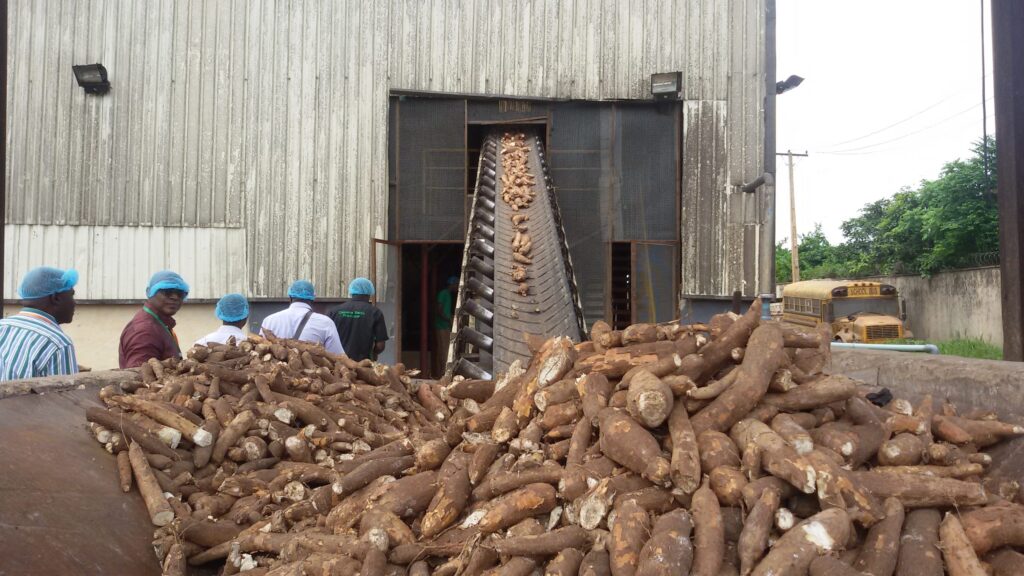Cassava is a staple crop in Nigeria, and the country holds the title of the largest producer in the world. Despite this, Nigeria has yet to fully harness the economic potential of cassava processing and value addition. For investors seeking profitable agribusiness ventures, cassava processing presents a golden opportunity. Here is a checklist to guide you in starting a successful cassava processing and value addition business.
1. Market Research and Feasibility Study
Understanding the cassava value chain is critical for success. Conduct thorough market research to identify:
- Demand for processed cassava products such as garri, starch, cassava flour, and ethanol.
- Target markets (local, regional, or international).
- Competition and pricing strategies. A feasibility study will help you determine the viability of your business idea and the most profitable product to focus on.
2. Choose a Niche
Cassava has diverse value addition opportunities. Select a niche that aligns with your budget, expertise, and market demand. Popular niches include:
- Garri production: A staple food across Nigeria and Africa.
- High-quality cassava flour (HQCF): Used in baking and industrial applications.
- Industrial starch: Key input in textiles, paper, and pharmaceuticals.
- Ethanol production: For use in beverages, biofuels, and sanitizers.
3. Secure Land and Facilities
Identify a location close to cassava farms to minimize transportation costs. Ensure the site meets the following criteria:
- Access to utilities such as water, electricity, and good roads.
- Adequate space for processing equipment, storage, and packaging.
- Compliance with environmental and regulatory requirements.
4. Procure Quality Cassava Roots
The quality of your raw materials significantly impacts the end product. Partner with reliable cassava farmers or consider owning a cassava farm to ensure a consistent supply of high-quality roots. Use improved cassava varieties such as TME 419, which have high starch content and are disease-resistant.
5. Invest in Appropriate Equipment
Efficient processing equipment is vital for maintaining quality and meeting demand. Some essential machines include:
- Peeling and washing machines.
- Grating machines.
- Hydraulic press or dewatering machines.
- Dryers (flash dryers for HQCF or rotary dryers for industrial starch).
- Packaging equipment.
6. Comply with Regulatory Standards
Adherence to food safety and quality standards is non-negotiable, especially if you plan to export. Obtain necessary certifications and licenses such as:
- NAFDAC (National Agency for Food and Drug Administration and Control).
- SON (Standards Organisation of Nigeria) certification.
- Export documentation for international markets.
7. Develop a Business Plan
A well-structured business plan is your roadmap to success. Include the following:
- Business objectives and goals.
- Target market and marketing strategies.
- Financial projections and funding requirements.
- Operational plans and risk management strategies.
8. Secure Funding
Cassava processing requires significant investment in equipment and facilities. Explore funding options such as:
- Personal savings.
- Agricultural loans and grants.
- Partnerships or crowdfunding.
- Government intervention funds such as the Anchor Borrowers’ Program (ABP).
9. Build a Skilled Workforce
Hire experienced personnel for critical roles such as production management, quality control, and marketing. Invest in training programs to enhance skills and efficiency.
10. Develop a Marketing Strategy
Promoting your products effectively is essential for profitability. Consider the following strategies:
- Leverage social media platforms to create awareness.
- Participate in agricultural trade fairs and exhibitions.
- Collaborate with distributors and retailers.
- Offer competitive pricing and excellent customer service.
11. Plan for Sustainability
Sustainability is key to long-term success. Focus on waste management by converting cassava by-products into animal feed or biogas. Adopt energy-efficient technologies and source raw materials responsibly.
12. Monitor and Evaluate
Continuously monitor your business operations to identify challenges and opportunities for improvement. Use key performance indicators (KPIs) such as production efficiency, sales growth, and customer satisfaction to gauge success.
Conclusion
Starting a cassava processing and value addition business in Nigeria can be highly rewarding if approached strategically. By following this checklist, investors can unlock the full potential of cassava and contribute to Nigeria’s economic growth. Take the leap today and tap into this lucrative agribusiness opportunity.


